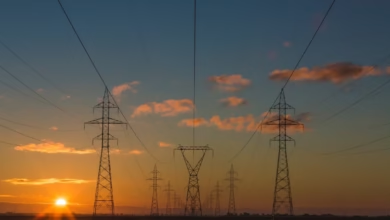Unlocking the Future: Natural Gas and Oil Co-Production’s Role in Shaping Global Oil Trade and Market Trends

The synergy between natural gas and oil has become a focal point in the energy sector, particularly as the world grapples with fluctuating oil prices and a growing demand for cleaner energy solutions. Natural gas and oil co-production, which involves the joint extraction and processing of these vital resources, presents a myriad of opportunities and challenges in the evolving landscape of global energy. This article delves into the intricacies of co-production techniques, exploring how innovations in oil technologies and oil field services are reshaping the industry. We will also examine the implications of co-production on the global oil trade, highlighting its impact on oil market trends and OPEC strategies. Furthermore, as energy security remains paramount amidst rising oil consumption and geopolitical tensions, we will assess the environmental impact of oil and natural gas co-production and consider its future alongside emerging oil alternatives and biofuels. Join us as we explore this complex interplay of oil, natural gas, and the pressing need for sustainable practices in energy production.
- 1. **"Understanding Natural Gas and Oil Co-Production: A Deep Dive into Joint Extraction Techniques"**
- 2. **"The Global Oil Trade: Impact of Co-Production on Oil Prices and Market Trends"**
- 3. **"Balancing Energy Security and Environmental Impact: The Future of Oil and Natural Gas Co-Production"**
1. **"Understanding Natural Gas and Oil Co-Production: A Deep Dive into Joint Extraction Techniques"**
Understanding the co-production of natural gas and crude oil is essential for grasping the complexities of modern energy extraction. Co-production refers to the simultaneous extraction of both natural gas and oil from the same reservoir, which is increasingly becoming a favored technique due to its efficiency and economic benefits. This process involves advanced oil technologies that optimize the extraction and processing stages, enabling companies to maximize their output while minimizing costs.
One notable technique utilized in joint extraction is hydraulic fracturing, commonly associated with shale oil production. This method enhances oil recovery by injecting high-pressure fluid into the geological formations, thereby releasing both oil and natural gas. As oil market trends continue to evolve, the ability to harness both resources from a single site has significant implications for energy security and the global oil trade. The extraction of these resources often occurs in offshore drilling environments, where the complexity of oil field services comes into play. The demand for oil transportation infrastructure, such as pipelines, is crucial for moving these resources to processing facilities.
The integration of natural gas and oil refining processes also opens new avenues for the downstream oil sector. By processing both resources together, companies can create a variety of petrochemicals and biofuels, which serve as oil alternatives and contribute to reducing the environmental impact of oil consumption. As oil prices fluctuate and geopolitical tensions affect oil supplies, the ability to co-produce natural gas and oil can serve as a strategic advantage for companies engaged in oil investing.
Moreover, understanding the regulatory landscape surrounding oil compliance and oil regulation is vital for companies operating in this space. Compliance with environmental standards ensures that the extraction processes meet necessary guidelines, which in turn influences public perception and investment decisions in oil sands and other resource-rich areas.
As the world shifts towards a more sustainable energy future, the interplay between natural gas and oil co-production will play a pivotal role in shaping oil supply chains and influencing oil price hedging strategies. The industry's response to these dynamics will ultimately determine the future of oil consumption and the viability of various energy sources, including renewables and biofuels.
In summary, the joint extraction and processing of oil and natural gas not only represent a considerable advancement in oil technologies but also address critical issues in energy security, environmental impact, and the ever-evolving landscape of global oil geopolitics. As trends continue to shift, the importance of understanding this co-production model cannot be overstated for stakeholders across the energy sector.
2. **"The Global Oil Trade: Impact of Co-Production on Oil Prices and Market Trends"**
The global oil trade is intricately linked to the dynamics of co-production, where oil and natural gas are extracted simultaneously. This method not only enhances operational efficiency but also significantly impacts oil prices and market trends. As countries continue to seek energy security, the joint extraction of these fossil fuels has reshaped supply chains and influenced geopolitical strategies.
One of the primary effects of co-production on oil prices is its potential to stabilize supply. By utilizing existing infrastructure for both oil and natural gas extraction, companies can reduce operational costs, which may lead to more competitive pricing in the oil market. This is particularly evident in regions with abundant shale oil reserves and offshore drilling capabilities, where the integration of natural gas extraction can offset fluctuations in crude oil prices. As a result, oil price hedging strategies become increasingly vital for investors looking to navigate the complexities of the global oil trade.
Moreover, the influence of organizations like OPEC cannot be overlooked. As member countries adapt their production strategies to include natural gas alongside oil, the organization's ability to control oil prices hinges on these new co-production methods. The integration of oil refining processes with natural gas processing also opens avenues for more efficient downstream oil operations, affecting everything from oil storage to transportation.
The environmental impact of oil production remains a critical consideration as well. As the world shifts toward biofuels and oil alternatives, the co-production model can offer a more sustainable pathway by maximizing resource utilization and minimizing waste. However, it also raises questions about oil consumption patterns and the future of oil technologies, especially in the context of stringent oil regulation and compliance requirements.
In conclusion, the co-production of oil and natural gas not only influences market trends but also shapes the landscape of the global oil trade. As producers adapt to changing energy demands and geopolitical challenges, the interplay between oil and natural gas will continue to play a crucial role in determining future oil prices and the overall health of the oil market.
3. **"Balancing Energy Security and Environmental Impact: The Future of Oil and Natural Gas Co-Production"**
The future of oil and natural gas co-production hinges on finding a delicate balance between energy security and mitigating environmental impact. As global energy demands continue to rise, the oil and natural gas sectors are under pressure to enhance production while adhering to stricter environmental regulations. This dual focus is particularly crucial given the volatile nature of oil prices and the intricate dynamics of the global oil trade.
One of the primary concerns when discussing co-production is the environmental impact of oil extraction and processing. The extraction of crude oil, particularly from shale oil and oil sands, poses significant challenges. It often involves techniques that can lead to water pollution and greenhouse gas emissions. As public awareness of climate change grows, there is an increasing demand for cleaner alternatives and more sustainable practices in oil refining and transportation. The integration of biofuels and other oil alternatives into the energy mix could alleviate some of these environmental concerns while ensuring energy security.
Moreover, oil geopolitics plays a critical role in shaping the future of co-production. Countries with substantial oil reserves often wield significant influence over OPEC decisions and global oil market trends. The strategic partnerships formed through co-production agreements can enhance oil supply chains, yet they must also navigate the complexities of oil regulation and compliance. This balancing act is crucial, especially as nations aim to secure their energy needs without compromising environmental standards.
Innovative oil technologies are emerging that promise to improve efficiency and reduce the environmental footprint of oil production. Advances in oil field services, offshore drilling, and oil storage solutions can lead to more sustainable practices in the industry. For instance, enhanced oil recovery techniques can optimize extraction processes while minimizing waste.
Looking ahead, oil price hedging strategies will be essential for investors to navigate the unpredictable nature of the oil market. As oil consumption patterns shift and new policies emerge, understanding the interplay between energy security and environmental impact will be vital for stakeholders in the oil and natural gas sectors. By prioritizing sustainable practices and adopting innovative technologies, the industry can work towards a future that meets both energy demands and environmental imperatives.
In conclusion, the future of oil and natural gas co-production will be defined by the industry's ability to adapt to changing market conditions, regulatory landscapes, and societal expectations. Balancing energy security with environmental stewardship will not only shape oil exploration and production practices but also influence the broader narrative of global energy sustainability.
In conclusion, the joint extraction and processing of oil and natural gas represent a pivotal shift in the landscape of energy production. As we explored the intricacies of co-production techniques, it is evident that this approach not only streamlines operations but also enhances the efficiency of oil refining and the overall management of oil supply chains. The impact on the global oil trade is significant, influencing oil prices, market trends, and the dynamics of OPEC and shale oil production.
Moreover, as energy security becomes increasingly critical, the balance between maximizing oil consumption and mitigating the environmental impact of oil extraction is essential. Future advancements in oil technologies and compliance with stringent regulations will play a crucial role in ensuring sustainable practices within the sector. The integration of biofuels and oil alternatives into our energy mix may also redefine our reliance on traditional oil and natural gas sources.
As oil investors and stakeholders navigate the complexities of oil geopolitics and offshore drilling, understanding these trends will be vital for making informed decisions. The evolution of oil storage and transportation methods, along with innovative oil field services, will further influence the future landscape of the energy market.
In summary, the co-production of natural gas and oil represents a promising avenue for enhancing energy efficiency while addressing environmental concerns. By embracing these innovative methods and prioritizing sustainability, we can secure a balanced energy future that meets the demands of global oil consumption while safeguarding our planet for generations to come.
**Meta Description:** Explore the impact of natural gas and oil co-production on the global oil trade, market trends, and energy security, while addressing the environmental impact of oil extraction and refining.





